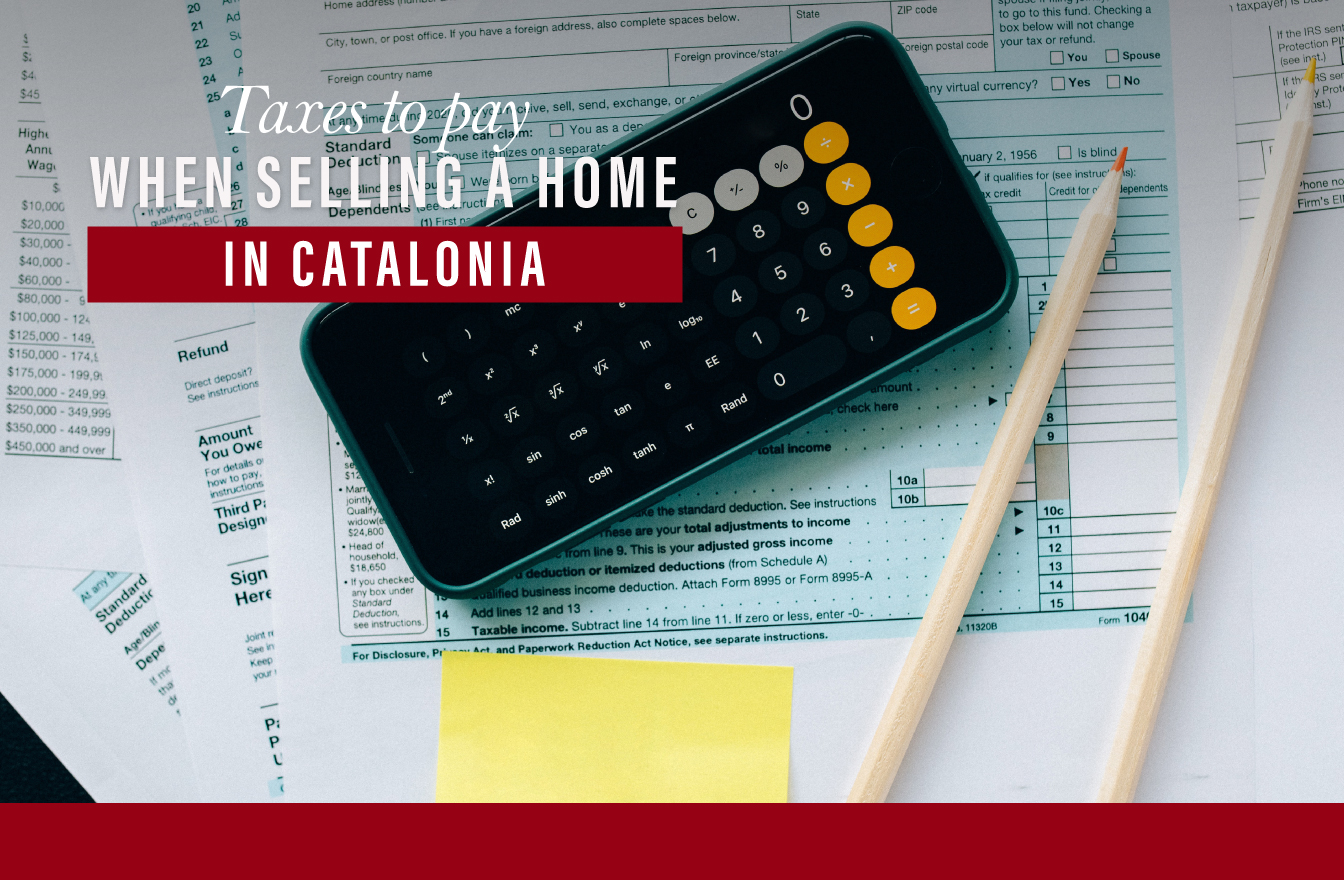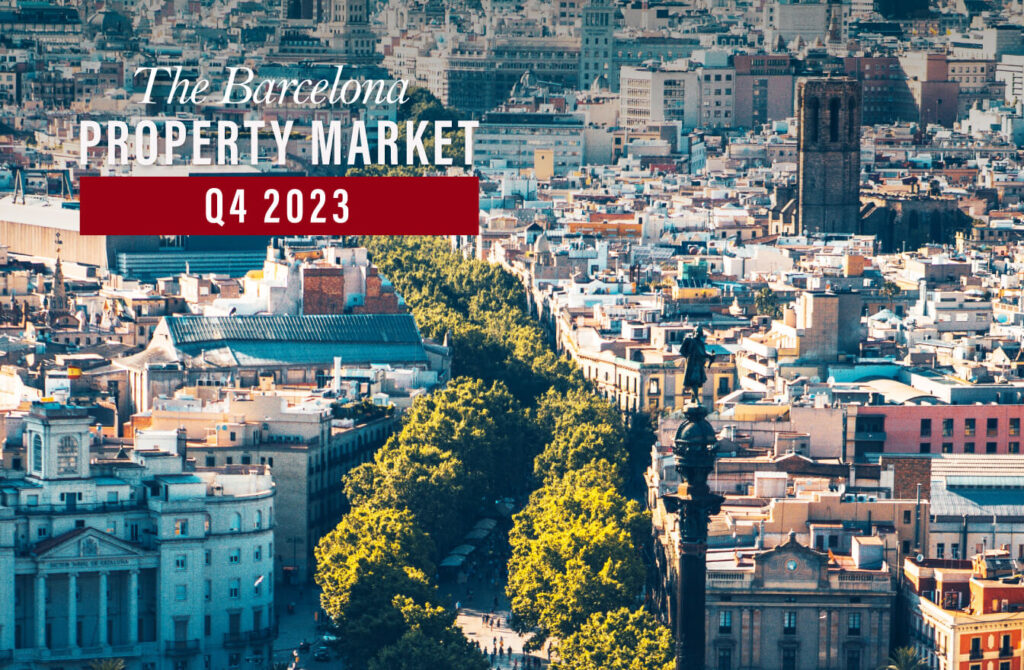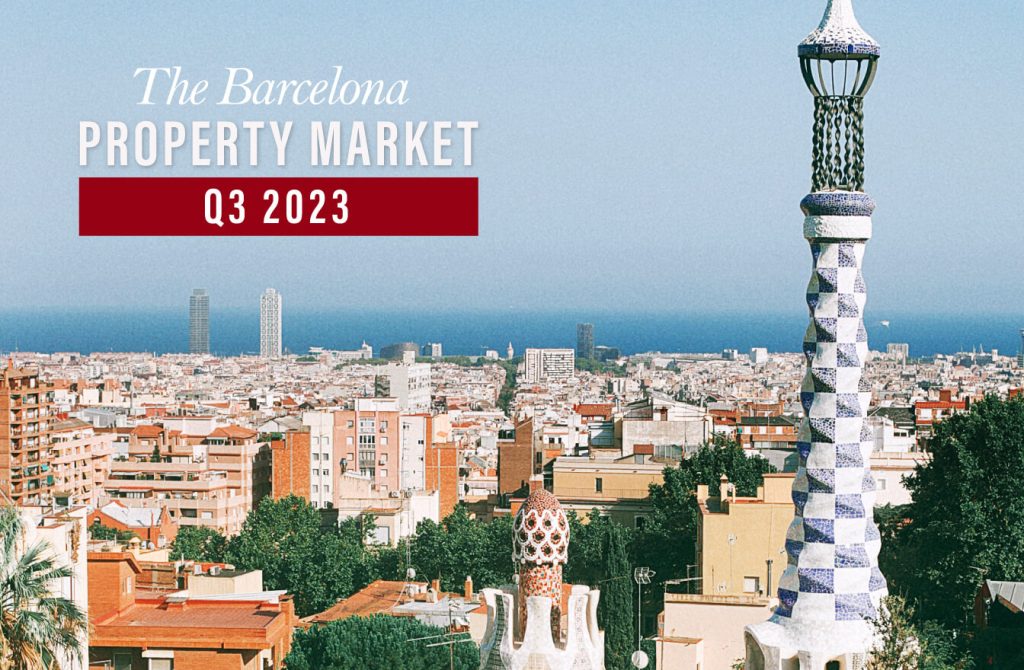
Are you looking for what taxes apply to the sale of a home in Catalonia? Do you want to know what the buyer and the seller pays? Here, we will clarify everything in order to you can know all the details.
It’s common for buyers to add 10-15% on top of a property’s sale price – but that’s not going to the seller. These additional costs are likely to be paid to the Spanish tax authorities for the sale of a property, to a notary’s office, to the Registro de la Propiedad (land registry), to the bank as mortgage fees, to a real estate agency and/or to a lawyer or tax accountant (gestor).
As you’ll see below, the seller also has a number of taxes to pay when selling a property in Cataluña.
Who pays the costs when selling a property?
Both the buyer and the seller of a property pay costs and taxes aside from the purchase price.
The seller in particular could have substantial taxes to pay when selling a property in Cataluña. However, these depend on the capital increase. There also exists many exemptions and reductions (detailed below) and there are even situations in which a seller pays no taxes at all on a property sale.
If the services of a real estate agency are used these will need to be paid by the seller.
Furthermore, the seller may not have all the documents required to sell a property in Cataluña. Some of these documents – like an energy efficiency certificate or a technical building inspection (ITP in Spanish) – may require contracting a specialist at a cost.
What taxes to pay when selling a property in Cataluña?
The taxes to pay when selling a property in Cataluña can be split in two: the taxes the seller must pay, and the taxes the buyer must pay.
The main taxes the seller of a property will pay are:
– Income tax (Impuesto sobre la Renta de las Personas Físicas, or IRPF).
– Surplus value tax (Plusvalia, or Impuesto sobre el Incremento de Valor de los Terrenos de Naturaleza Urbana, IIVTNU)
The main taxes the buyer of a property will pay are:
– Valued Added Tax (IVA in Spanish) at 10% in Cataluña if the property is a newbuild.
– Stamp duty (Impuesto sobre Actos Jurídicos Documentados, IAJD) at 1.5% in Cataluña if the property is a newbuild.
– Patrimonial transfer tax (Impuesto de Transmisiones Patrimoniales, ITP) at 10% in Cataluña if the property is second-hand. This can be reduced to 5% if the property bought will be the main family home for large families, people with disabilities and or young buyers in Cataluña.
The exact amount of income tax a seller must pay to sell a property in Cataluña depends on the capital gain, and is paid to the central Spanish tax agency (Agencia Tributaria).
The amount of capital gains tax a seller must pay in Cataluña depends on the cadastral value of the property (not the sale price) and how long the seller has owned it. This tax is paid to the municipality within which the house is located.
What taxes does the seller of a property pay?
Income tax – IRPF
If you sell a property in Cataluña for a higher price than you bought it, you will need to pay income tax on the capital gain.
The capital gain will need to be declared in your annual tax return (declaración de la renta) and liquidated between January and June 30 of the following year. The exact amount of income tax to pay when selling a property in Cataluña depends on the capital gain itself – and after any associated costs are deducted.
The capital gain can be calculated by subtracting the original purchase price from the sale price. From this figure you can subtract any notary costs, taxes or real estate agency commissions necessary for the sale.
The income tax you will pay will depend on the resulting amount:
– 19% income tax up to €6,000
– 21% income tax between €6,000 and €50,000
– 23% income tax between €50,000 and €200,000
– 26% income tax over €200,000
Exemptions and reductions to paying income tax when selling a property in Catalonia do exist:
– No capital gain. If you did not make a capital gain on your property (you sold it for less than you bought it) you will not need to pay income tax. You will need to declare the property sale in your annual tax return, however.
– Over 65. You will not need to declare the capital gain on a property sale if you are over 65 or a dependent, and the property was your primary home.
– Reinvesting in a primary home. If the money earned is put towards buying a new habitual residence – or towards renovating your future primary home – you will not need to pay income tax. You have a period of two years in which to use your capital gain in this way.
– Insulation. If you have renovated the home you are selling – and reduced heating costs by more than 7% – you can reduce the capital gain exposed to income tax by 20%.
– Energy efficiency. If you have renovated the home you are selling and saved 30% in your non-renewable energy consumption (or achieved an efficiency of A or B according to EU energy performance regulations) you can reduce the capital gain exposed to income tax by 40%.
– Energy efficiency in an apartment block or residency. If you are the owner of an apartment block or residency, and have improved the energy efficiency of the entire building through renovations, you can reduce the capital gain exposed to income tax by 60%.
– Rental costs. If you rented out the property you are selling, you can subtract any repair, maintenance, community, insurance, waste collection and property taxes from the capital gain exposed to income tax.
Note: The Spanish treasury (Hacienda) considers a home your primary residence if you have lived there uninterrupted for three years prior to selling the property.
Due to the range of measures to reduce taxes when selling a property in Cataluña, it is advisable to use the services of an experienced real estate agency or accountant.
Surplus value tax – plusvalía municipal
Surplus value tax in Spain is a tax payable to the municipal government in which a property is located.
When selling a property in Cataluña, this will be to one of the 947 ajuntament in the autonomous community. If you are selling a house in Barcelona you will pay the plusvalía municipal aka the Impuesto sobre el Incremento de Valor de los Terrenos de Naturaleza Urbana (IIVTNU) to the Ajuntament de Barcelona.
Since 2021, there exists two different ways of calculating surplus value tax in Spain. The seller can choose which tax is more beneficial when selling a property.
These two methods to calculate surplus value tax are:
– Plusvalía Real. This is calculated by subtracting the original purchase price from the sale price of a property, and then multiplying this by the porcentaje del valor catastral del terreno. This final figure can be found on any property tax (IBI) receipt.
– Incremento objetivo de la base imponible del valor del terreno. This is calculated by multiplying the valor catastral del terreno (cadastral value) by a coefficient determined by the numbers of years for which the seller has owned the property. The Spanish Treasury guidelines establish a coefficient of 0.14% if a property is owned for less than a year, and 0.45% when owned for 20 years or more (the limit).
Both the percentage of the cadastral value and the actual cadastral value of a property are established by relevant town halls, and can be found on a recent property tax (IBI) receipt or on the Spanish Sede Electrónica del Catastro. As such, they are separate to the actual sale price of a property.
Whichever method of calculating the surplus value tax to pay when selling a property in Cataluña, you will need to liquidate it within 30 days after the sale.
If you sold a property for less than you bought it, you will be exempt from paying surplus value tax. You can find out more about surplus value tax in Barcelona here.
What other costs are involved when selling a property in Catalonia?
Taxes are not the only costs involved when selling a property in Catalonia. Below we will explore some of the extra expenses to consider, as these could subtract from the sale price you are expecting to receive.
Notary’s office
The final contrato de compraventa (contract of sale) is typically signed by both seller and buyer before a notary in Spain.
The notary will require a number of documents from the seller, and also facilitate the publication of the contract of sale in the Spanish property register (Registro de la Propiedad). A contract of sale written by a notary can be referred to in a court of law and provides the basis for any potential future disputes.
The cost of contracting a notary’s office when selling a property in Cataluña can cost between €90 to €600, and typically around €350.
Documents required by the notary
When using a notary to sign the final contract of sale, the seller will be required to produce various documents. These include an energy performance certificate, a technical inspection of the building (ITP), a certificate of habitation, a certificate of zero debt (or outstanding debt) from your mortgage provider and the nota simple.
Obtaining each of these documents above will come with a cost if you do not have them when selling a property in Cataluña.
Mortgage payments
If you have outstanding mortgage payments when selling a property in Cataluña, these must be liquidated.
You can pay off your mortgage using money from the house sale – in this case, you must present a certificate (Certificado de Deuda Pendiente) to the notary’s office showing how much debt remains to be paid. The buyer’s bank will typically send a cheque to your mortgage provider with the remaining cash to liquidate the mortgage.
On many occasions your mortgage provider will charge you for paying off your mortgage before the end of your repayment term. This can cost between €500 to €1,200 depending on the outstanding debt.
Bear in mind that requesting such certificates from your bank to present before a notary’s office can also cost up to €100.
Property tax payments (IBI)
If you are signing the contract of sale at a notary’s office, you will be required to produce the most recent property tax payment (IBI).
This is a formality to ensure the seller is up to date with payments and debts on the house. If you haven’t paid your most recent property tax payment (in Cataluña the payment can be made in instalments throughout the year) you will need to settle this cost up.
In Catalonia, the annual property tax is 0.66% of the cadastral value of your property.
Real estate agency costs
If you use the services of a real estate agency to sell your property in Cataluña, you will typically pay a percentage of the sale price as a commission.
You can find more information about real estate commissions in our blog articles.
Conclusion: How much will I end up paying for the sale of my property?
The taxes to pay when selling a property in Cataluña depend on if you actually made a profit on the sale.
If you use an experienced real estate agency and time your house sell well, you will ideally have made a capital gain and so will be paying income tax and surplus value tax on the property.
The amount of tax to pay when selling a property will then depend on the capital increase, or capital gain, of the sale. Though this can rise to 26% at most, there are many ways to reduce the amount of capital gain exposed to income tax. The services of an experienced real estate agency or accountant are vital to ensure keeping taxes on selling a property in Cataluña as low as possible.
BCN Advisors are a leading real estate agency based in the city of Barcelona in Cataluña. You can find out more about how we help you to buy a house to renovate it here, or our 10 tips of how to buy a property in Barcelona here.
For any other queries on buying or selling a house in Barcelona, don’t hesitate to contact us
You may also like...
-
 Evolution of the Barcelona real estate market: Q4 2023
Evolution of the Barcelona real estate market: Q4 2023
-
 Barcelona house price forecast 2024
Barcelona house price forecast 2024
-
 Evolution of the Barcelona real estate market: Q3 2023
Evolution of the Barcelona real estate market: Q3 2023
 MercadoNewsReal Estate
MercadoNewsReal Estate 

